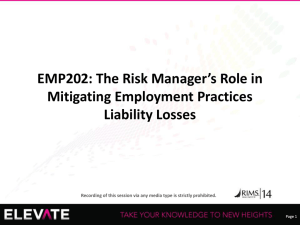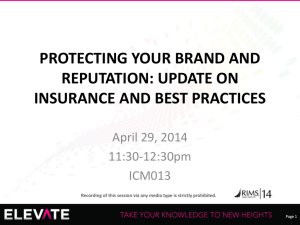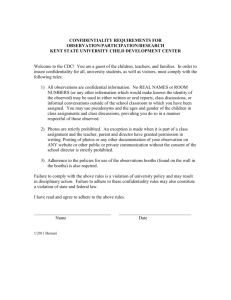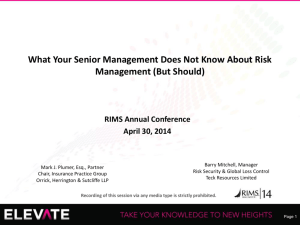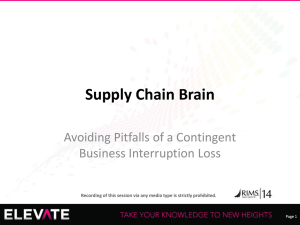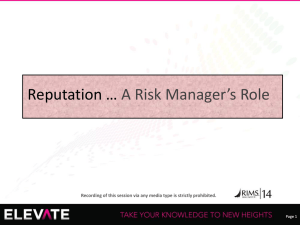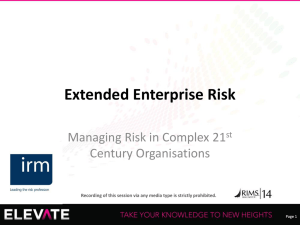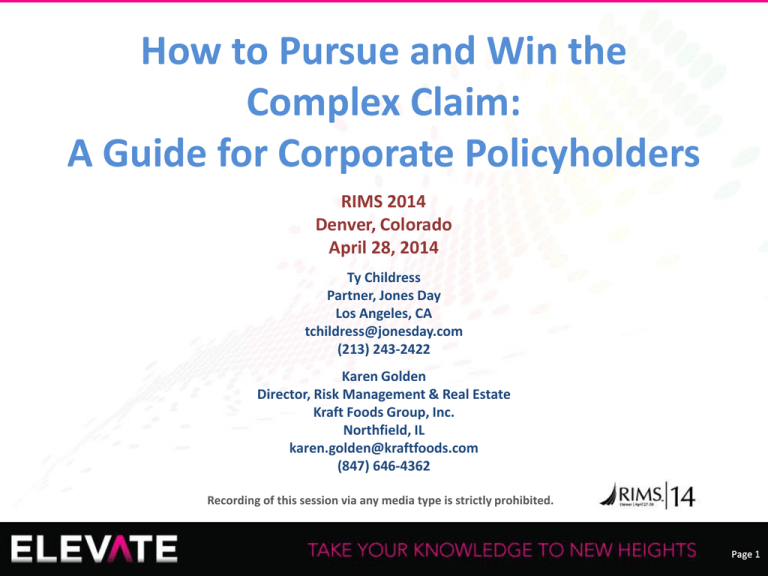
How to Pursue and Win the
Complex Claim:
A Guide for Corporate Policyholders
RIMS 2014
Denver, Colorado
April 28, 2014
Ty Childress
Partner, Jones Day
Los Angeles, CA
tchildress@jonesday.com
(213) 243‐2422
Karen Golden
Director, Risk Management & Real Estate
Kraft Foods Group, Inc.
Northfield, IL
karen.golden@kraftfoods.com
(847) 646-4362
Recording of this session via any media type is strictly prohibited.
Page 1
What to Expect
Attendees should hopefully gain valuable insights into
how to:
(1) Develop a comprehensive claim strategy that
maximizes insurance recoveries in conjunction with
a defense of underlying claims;
(2) Manage claims that may implicate multiple parties,
coverage years, and types of policies; and
(3) Identify and avoid common pitfalls during the
claims process that hamper or delay recovery of
insurance benefits.
Recording of this session via any media type is strictly prohibited.
Page 2
FIRST STEPS AFTER RECEIPT OF A COMPLAINT
• Who are the actual defendant(s)?
– How does this correlate with insureds listed on the
policy and the named insured definition?
• Basic risk transfer analysis
– Has this risk been transferred via insurance or
contractual indemnity?
• Are there reasons complicating the risk
transfer?
– Sensitive contractual relationship with other parties
involved?
– Policy renewal issues?
– Fronting policy issues?
Recording of this session via any media type is strictly prohibited.
Page 3
IDENTIFICATION AND REVIEW OF POTENTIALLY
APPLICABLE POLICIES/CONTRACTS
•
•
•
•
Often multiple policies implicated
Additional insured coverage
Are there prior, potentially related, claims?
Exposure periods (multiple policy years
potentially implicated)
• Exposure size (primary, umbrella, excess analysis)
• Predecessor entities involved?
• Are indemnification obligations implicated?
Recording of this session via any media type is strictly prohibited.
Page 4
NOTICE ISSUES
• Which insurers should be notified?
– Notice prejudice/no prejudice jurisdictions
• Active versus precautionary notice
– Does notice include demand for defense?
• Targeted tender issues
• What level of information/detail to provide
– Characterization of allegations
– Information is potentially discoverable in
underlying litigation
Recording of this session via any media type is strictly prohibited.
Page 5
THE INSURERS’ INITIAL RESPONSE
• Insurers have statutory obligations regarding
timeliness of responses
• Adjusters’ good faith obligations
–Lay out your expectations
• Not all “reservation of rights” are created equal
• Insurers with defense obligations have
particular obligations
• Has the insurer responded for each insured and
each policy?
Recording of this session via any media type is strictly prohibited.
Page 6
DEFENSE ISSUES
• Denial of coverage
–Likely triggers statute of limitations
–Insured is free to protect its own interests
• Defense without reservation
–Insurer has broad discretion with handling of
claim
• Defending under reservation of rights
–What rights are reserved?
–Is potential conflict raised?
–Right to independent counsel?
Recording of this session via any media type is strictly prohibited.
Page 7
DEFENSE COUNSEL ISSUES
• Does policy have terms governing selection of
counsel?
• If potential conflict, can the insured select
counsel irrespective of insurer’s views?
• What if one implicated policy requires panel
counsel and another policy does not?
• Hourly rate dispute
• Privilege issues
Recording of this session via any media type is strictly prohibited.
Page 8
UNDERLYING LITIGATION
COORDINATION
• Coordinate underlying defense with coverage
implications
– Coverage implications associated with different causes of
action
– Allegation dates versus coverage dates
– Identity of named versus unnamed entities involved
• Disclosure of insurance in underlying litigation
• Presentations to insurers
– Consider scope of use in subsequent proceedings
• Privilege issues
– Laws vary dramatically by jurisdiction
– Is insurer actually “defending”
• Budget discussions
Recording of this session via any media type is strictly prohibited.
Page 9
UNDERLYING SETTLEMENT ISSUES
• Notify insurer early and often of settlement
status and expectations of participation
• Consider pros and cons of insurer attendance
at a mediation
– What message do you want to send the opposing
party?
• “Demand within limits” considerations
• Settling without the insurer and related
consent issues
Recording of this session via any media type is strictly prohibited.
Page 10
PREPARING FOR COVERAGE
LITIGATION
• Need to ensure adjusters’ files have all the
information you want as evidence
• All meetings, communications, efforts
thoroughly documented
• Show pattern and practice of insurer
• Document actual and consequential damages
Recording of this session via any media type is strictly prohibited.
Page 11
COVERAGE LITIGATION
• Procedural/policy requirements
• Forum selection issues
• Potential stay of litigation
–Is underlying case still pending?
–Is there a risk of prejudice to the underlying
defense?
• What relief to seek
–Declaratory relief
–Breach of contract
–Bad faith
• Multiple insurers?
Recording of this session via any media type is strictly prohibited.
Page 12
COVERAGE LITIGATION (cont’d)
• Early dispositive motions
–Duty to defend usually requires no, or very
limited, discovery
• Early expert involvement
• Critical document discovery
–Underlying claims files
–Electronic note files
–Privilege issues/insurer counsel
–Reserves
–Reinsurance
• Preparing the jury story
Recording of this session via any media type is strictly prohibited.
Page 13
SETTLING THE COVERAGE CLAIM
• Maximizing settlement leverage while
underlying claim is still pending
• Settlement structures vary dramatically
– Claim release
– Policy release
– Coverage-in-place agreements
– Interim funding arrangements
– Indemnification
– Assignment of claim to underlying plaintiff
– Subrogation issues
• Primary exhaustion/excess trigger issues
Recording of this session via any media type is strictly prohibited.
Page 14
AFTER THE CLAIM
• Review policy terms and provisions
–Problematic endorsements/exclusions
–Panel counsel issues
–Renewal terms
• Review insurer relationship generally
• Review contractual relationships with
indemnitors/vendors
• Review internal performance of team
Recording of this session via any media type is strictly prohibited.
Page 15
QUESTIONS?
THANK YOU!
Recording of this session via any media type is strictly prohibited.
Page 16
Contact Information
Ty Childress
Partner, Jones Day
Los Angeles, CA
tchildress@jonesday.com
(213) 243‐2422
Karen Golden
Director, Risk Management & Real Estate
Kraft Foods Group, Inc.
Northfield, IL
karen.golden@kraftfoods.com
(847) 646-4362
Recording of this session via any media type is strictly prohibited.
Page 17

